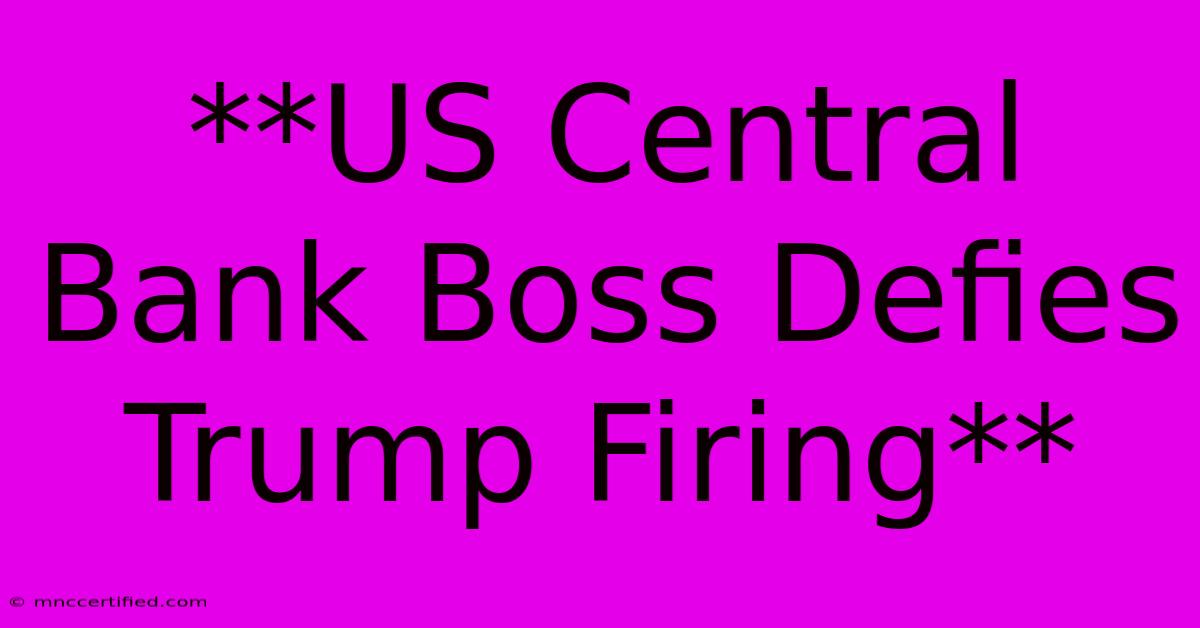**US Central Bank Boss Defies Trump Firing**

Table of Contents
US Central Bank Boss Defies Trump Firing: A Stand for Independence
The world watched in astonishment as President Donald Trump attempted to fire Federal Reserve Chair Jerome Powell in 2019. This unprecedented move, fueled by Trump's dissatisfaction with the Fed's interest rate hikes, ignited a firestorm of controversy and sparked a critical debate about the independence of the US central bank.
The Power Struggle: Trump vs. The Fed
The tension between the White House and the Federal Reserve had been simmering for months. Trump, a vocal critic of the Fed's monetary policy, believed that rising interest rates were hindering economic growth. He publicly lambasted Powell and his team, urging them to loosen monetary policy and "get the job done."
However, the Federal Reserve, a body designed to operate independently from political pressure, maintained its course. Powell, a seasoned economist appointed by Trump himself, firmly believed in the Fed's mandate to maintain price stability and full employment, even if it meant taking actions unpopular with the president.
The Fallout: A Test of Institutional Integrity
Trump's attempt to fire Powell, a move he ultimately abandoned due to legal challenges and the potential consequences, sent shockwaves through the financial world. It raised serious questions about the future of the Federal Reserve's independence and the long-standing tradition of its non-political decision-making.
The implications of a politicized Federal Reserve are significant:
- Erosion of Trust: Interference from the political sphere would undermine public trust in the Fed's ability to act in the best interests of the nation.
- Economic Instability: Political pressure could lead to erratic and short-sighted monetary policy decisions, harming the economy in the long run.
- International Reputations: A politicized Fed would weaken the US dollar's standing as a global reserve currency and damage the reputation of the American financial system.
The Legacy: A Defense of Independence
While the firing never materialized, the saga of Trump vs. the Fed stands as a stark reminder of the importance of maintaining the independence of the central bank. Powell's defiance, though ultimately unsuccessful, was a testament to the crucial role of the Federal Reserve in ensuring a stable and prosperous US economy.
The episode sparked a renewed focus on the importance of safeguarding the Federal Reserve's independence. It emphasized the need for strong safeguards to prevent future attempts at political interference and protect the institution's role as a critical pillar of economic stability.
Looking forward, the future of the Federal Reserve's independence remains a key topic of debate. The ongoing political climate and potential shifts in power require careful consideration and vigilance to ensure that the Fed can continue to carry out its vital role without succumbing to undue political pressure.

Thank you for visiting our website wich cover about **US Central Bank Boss Defies Trump Firing**. We hope the information provided has been useful to you. Feel free to contact us if you have any questions or need further assistance. See you next time and dont miss to bookmark.
Featured Posts
-
Bengals Future Houshmandzadehs Take
Nov 08, 2024
-
Bank Of England Rate Cut Lower Mortgages
Nov 08, 2024
-
Bank Of England Cuts Rates To 4 75
Nov 08, 2024
-
Private Flood Insurance Lloyds Of London
Nov 08, 2024
-
Mutual Of Omaha Evidence Of Insurability
Nov 08, 2024